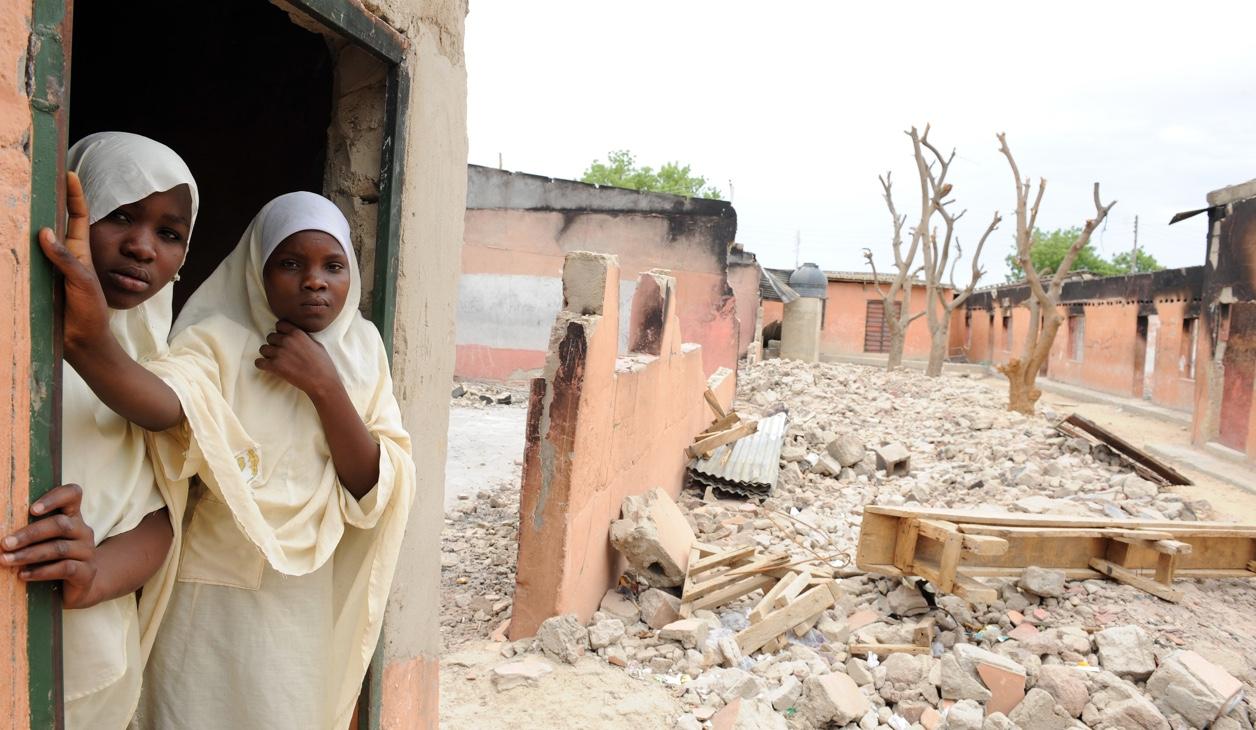Just how many girls has Boko Haram kidnapped in Nigeria?
Female students stand in a burnt classroom at Maiduguri Experimental School, a private nursery, primary and secondary school burnt by Boko Haram in Maiduguri, northeastern Nigeria on May 12, 2012.
NEED TO KNOW:
The Nigerian army announced yesterday that it had freed some 200 girls and nearly 100 women from the clutches of Boko Haram, the militant group blazing a trail of despair throughout Nigeria. It was hard not to immediately wonder if these were the same 200 girls who were famously snatched from a school a year ago, prompting the global awareness campaign #BringBackOurGirls.
They weren't. Experts admit that those girls, from the town of Chibok in Borno State, were likely separated long ago and that the possibility they will be found together is unlikely. The fact that 200 other girls were rescued is great news. But it also highlights just how many girls have been torn from their homes and lives over the last year by the terrorist group.
Amnesty International estimates that Boko Haram militants have kidnapped at least 2,000 women and girls since the beginning of last year. While officials have released no statement about the state of health or mind the girls were in when they were found, health workers and experts fear that they will have been radicalized by the group.
Boko Haram originated in the fight against British colonialism, then was nurtured by the corruption of a neglectful government. GlobalPost Senior Correspondent Erin Conway-Smith traveled to Nigeria recently to investigate what gave rise to the group, what fueled it, the devastating repercussions of its terror campaign, and what can be done to stop it. It's a long-read worth reading.
Conway-Smith says Boko Haram counts about 15,000 fighters in its ranks. Many are motivated by a deep unhappiness with the Nigerian government, led since 2010 by President Goodluck Jonathan, who is from Nigeria’s Christian-dominated, oil-rich southern delta.
Jonathan has been criticized for his handling of the fight against Boko Haram and in particular his response to the kidnapped Chibok girls. It was 100 days after the kidnappings before he even visited their families. Jonathan was voted out in March 2015 elections, and is due to step down in late May.
WANT TO KNOW:
Colombia just became only the fourth country in the world to legalize euthanasia. A terminally ill patient can now go to a doctor, tell them they no longer want to live, and the doctor can prescribe a treatment that would end their lives.
Belgium, the Netherlands and Luxembourg also permit it. But most of the world does not. The decision to allow euthanasia comes with major controversy. Many religions — especially Catholicism, which holds a lot of sway in Latin America — vehemently oppose it and insist palliative care should be the only option on the table, writes GlobalPost Senior Correspondent Simeon Tegel.
Euthanasia is not assisted suicide. The main difference is that with assisted suicide a patient is given the tools to carry out the suicide themselves. Euthanasia is when a doctor deliberately brings about the death of a patient. This practice brings up all kinds of ethical questions. Even organizations in the United States who support a person's right to die do not support euthanasia.
But Oregon-based euthanasia campaigner Derek Humphry told Tegel that doctors — sometimes with the family’s blessing, sometimes without — already hasten suffering patients’ deaths. And so laws like the one just passed in Colombia give the practice some legal oversight.
STRANGE BUT TRUE:
Nature is turning against cyclists in South Africa. A man was recently thought to have been killed by a marauding giraffe while he was out biking on the grounds of a game lodge.
This wouldn't be the first time a giraffe has turned on a South African cyclist. In a 2013 incident caught on video, a giraffe chased two mountain bikers at the Groenkloof Nature Reserve near Pretoria, trampling one of their bicycles before letting up.
And then there was that horrifying video, which of course went viral a few years back, in which a GoPro camera captured the dramatic scene of a South African mountain biker getting T-boned by an antelope during a race.
It's perhaps all just a not-so-gentle reminder that we are on their land, not the other way around.
Every day, reporters and producers at The World are hard at work bringing you human-centered news from across the globe. But we can’t do it without you. We need your support to ensure we can continue this work for another year.
Make a gift today, and you’ll help us unlock a matching gift of $67,000!
